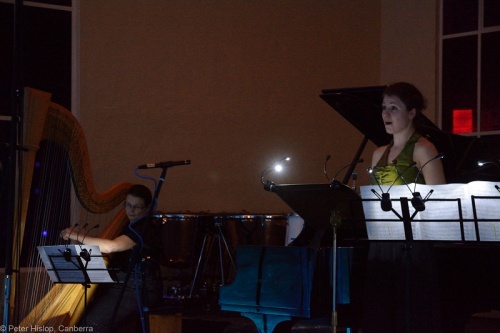IT is difficult to write about yesterday’s “Triumph of the Heart” concert.
To say that at least half the audience left the Fitters Workshop looking stricken or teary would be no overstatement – and yet, few could disagree, this was one of the loveliest concerts of the festival. Subtitled ‘Music from the camps’, this was a program of works by composers interred in concentration camps, most of whom died there: Erwin Schulhoff (a Bavarian camp), Pavel Haas (Auschwitz), Viktor Ullman (Auschwitz), Leo Smit (Sobibór), Ilse Weber (Theresienstadt). Robert Emanuel Heilbut survived Bergen Belsen but died just after its liberation from injuries sustained there. Both Rosy Wertheim and Dick Kattenburg survived the war.
“Triumph of the Heart” was an extraordinary concert – all the performers were impressive and the program carefully curated.
Two works stood out, Schulhoff’s Sextet and Weber’s “Wiegala”. Performed by Uppsala Chamber Soloists with cellist David Pereira, Schulhoff’s Sextet exemplified high European modernism in its crystalline formal clarity. Shifting harmonic fields and free 12-tone sonorities are unified by overarching dynamic shape. Schulhoff’s elegant orchestration balances full bodied dissonances and strong lines with a subtle mastery. Pereira and Uppsala Chamber Soloists performed with artistry and grace, carefully rendering the disparate emotional states – an industrial opening, the mysticism of the second movement and dance-like third, through to its portentous conclusion.
After the interval, seven candles were lit on the stage – one for each of remaining pieces in the program. One by one, after each performance, the candles were blown out. The concert concluded with Ilse Weber’s “Wiegala”, performed by soprano Simone Riksman and harpist Alice Giles. Program notes explained that Ilse Weber voluntarily accompanied sick children in Theresienstadt to her death in the gas chambers. As the doors to the gas chamber closed, she sang this lullaby, Wiegala, to the children. Riksman and Giles gave an achingly beautiful performance of this work. The soprano top register floated effortlessly and the harp produced a restrained and sorrowful harmonic base.
While the Schulhoff Sextet had been astonishingly good, the audience had at least survived it – but Weber’s lullaby, evoking images of a universal mother embracing children in the darkness of a gas chamber, threatened to undo us all.
A final harp note rang out into total silence and the last candle extinguished.
The audience stayed utterly mute – not a single sound could be heard for at least two minutes. Behind me a woman began to cry. Breaking this extraordinary stasis, Chris Latham walked onto the stage and the whole audience erupted to their feet. It took longer than normal for the hall to empty – women stayed back to fix their mascara while ashen-faced men waited with their coats.
I wondered if we’d learned anything from these musical treasures salvaged from the camps – something about love triumphing over darkness, as the name of this concert suggests. Perhaps the heart hasn’t triumphed over evil just yet, but last night’s concert reminded us that at least the struggle continues.
The post Review: Love triumphs over darkness in ‘extraordinary concert’ appeared first on Canberra CityNews.
